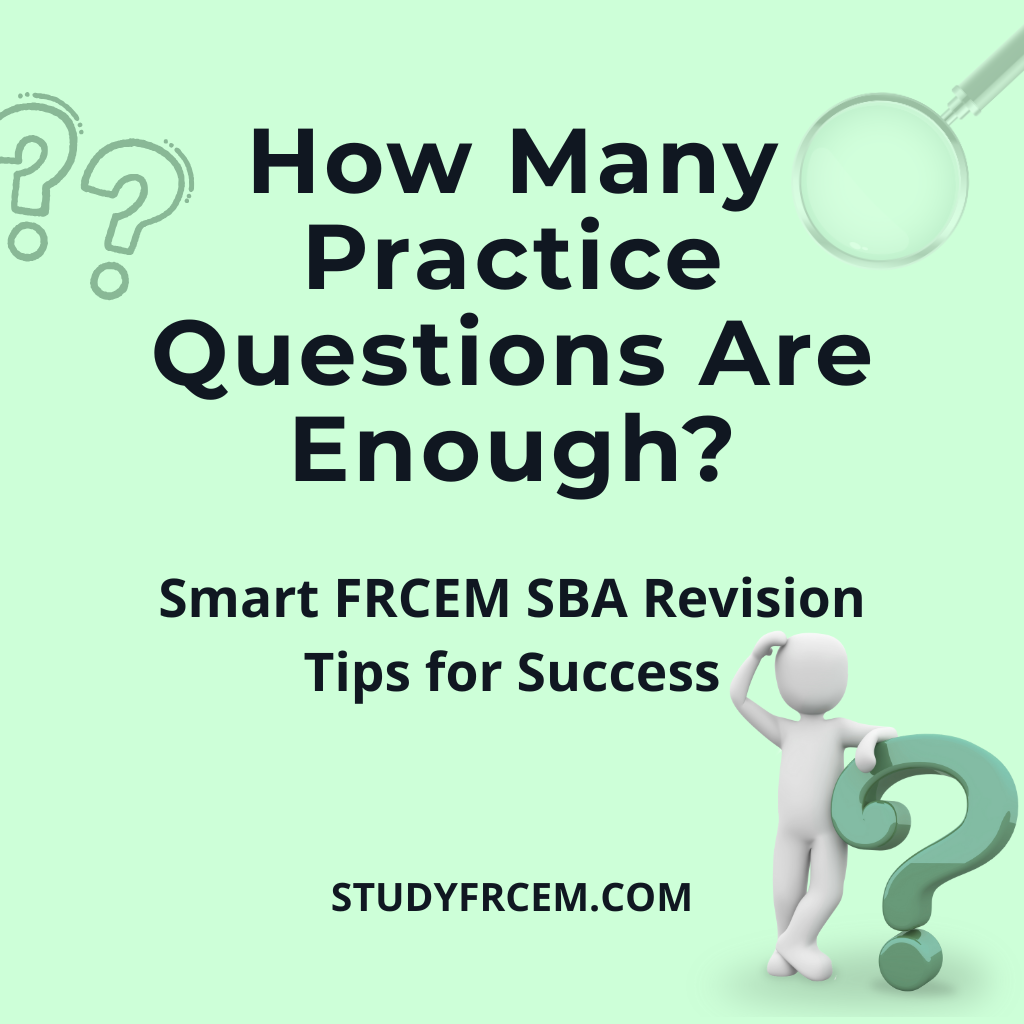Preparing for the FRCEM SBA exam is a significant step in your journey as an emergency medicine specialist. Whether it's your first attempt or coming back for a re-sit, how you approach your exam can impact your success. In this detailed guide, we'll cover the top exam preparation tips to help you conquer your FRCEM SBA exam, boost your confidence, and tackle the test with a solid game plan.
Let's jump right in!
Why Exam Techniques Matter for the FRCEM SBA Exam
Regarding exams like the FRCEM SBA, just knowing isn't enough. The candidates who shine know how to:
- Manage their time wisely
- Grasp the structure of SBA questions
- Think critically under pressure
- Steer clear of common mistakes on exam day.
Enhancing your exam techniques for the FRCEM can significantly boost your score even if you're confident in your content knowledge. Now, let's dive into some practical tips to elevate your preparation.
1. Get a Solid Grasp of the FRCEM SBA Exam Format
Which is a multiple-choice question exam that tests your clinical knowledge and decision-making skills. Before you dive into your revision, take a moment to understand fully:
- The number of questions (single-best-answer format)
- The time you have
- Scoring patterns
- Common distractors (wrong options that look right)
Why it matters: Familiarity with the structure helps minimize surprises on exam day, allowing you to stay calm and focused.
Tip: Download the latest FRCEM SBA blueprint from the RCEM website and align your study plan.
2. Develop a Strategic Study Plan (and Stick to It)
A well-organized study plan can save you from last-minute stress. Here's how to create one:
- Break the syllabus into bite-sized pieces
- Set daily, weekly, and monthly goals
- Prioritize high-yield FRCEM SBA topics first
- Reserve the last 2–3 weeks before the exam solely for practice and revision
Tip: Use planners or apps like Notion or Trello to visually track your study progress.
3. Start Practicing Timed Mock Exams Early
One of the top study tips for FRCEM SBA is to create exam-like conditions as soon as possible.
- This early practice will make you feel proactive and confident, giving you a head start in your preparation.
- Take full-length mock exams while sticking to strict time limits.
- Review the questions you got wrong, as well as the ones you got right, to understand your thought process.
- Learn to spot and eliminate obvious distractors in multiple-choice questions quickly, such as answers that are too extreme or those that are unrelated to the question.
Tip: Check out the StudyFRCEM.com quiz demo to practice realistic questions and keep track of your performance metrics.
4. Emphasize Active Recall and Spaced Repetition
Simply reading textbooks won't cut it. Instead, try using evidence-based techniques like:
Active Recall:
Quiz yourself regularly without peeking at the answers.
Spaced Repetition:
Review topics continuously to cement that knowledge in your memory.
Tip: Apps like Anki are fantastic for creating spaced repetition flashcards specifically for FRCEM SBA prep.
5. Pinpoint and Strengthen Your Weak Areas
- Pretending your weak topics don't exist won't help you at all. Focus on:
- Going over concepts you consistently struggle with.
- Reaching out for help from mentors or study groups.
- Practicing extra questions in those tricky areas.
Tip: Make a "Weak Topics Tracker" list to ensure you make targeted improvements weekly.
6. Perfect Your Time Management Skills
Time management can truly make or break your exam performance.
During your practice sessions:
- Set timers for each set of questions.
- Get into the habit of moving on if you find yourself stuck (you can always return to it later if time allows).
On exam day:
- Try to finish 10-15 minutes early so you can review any flagged questions.
- Aim for about 60–70 seconds per question.
Tip: Remember, the FRCEM SBA isn't just about getting every question right — it's about maximizing your score within the time you have.
7. Develop a Strategy for Answering SBA Questions
Here are some key techniques to master:
- Read the stem carefully and pinpoint those key clinical clues.
- Start by eliminating two wrong answers.
- Focus on identifying the most correct answer, not just any correct answer.
Tip: Don't overthink it! Your first instinct is often spot on when it comes to SBA questions.
8. Take Care of Your Physical and Mental Health
A sharp mind thrives in a healthy body. During your preparation:
- Aim for at least 7 hours of sleep each night.
- Get regular exercise, even if it's just a brisk 30-minute walk.
- Fuel your brain with balanced, nutritious foods (think omega-3-rich fish and nuts).
Tip: Steer clear of heavy cramming the night before. A little light revision combined with good sleep will help you recall information better than an all-nighter ever could.
9. Stay Positive and Manage Exam Anxiety
Feeling a bit nervous is entirely normal. But if anxiety becomes chronic, it can affect your performance. Here are some techniques to help reduce exam stress:
- Practice some breathing exercises.
- Use positive affirmations to boost your confidence.
- Visualize your success each night before the exam.
Tip: Build your confidence through small wins: set daily goals and reward yourself for consistently progressing.
10. Prepare Logistically for Exam Day
A week before the exam, make sure to:
- Know exactly where the exam venue is located.
- Gather your ID, admission documents, and any needed materials.
- Plan your journey, allowing for some extra time just in case.
Tip: Pack everything you need (like your ID, water, snacks, and stationery) the night before. This way, you can dodge any last-minute stress.
Final Thoughts: Mastering Exam Techniques for FRCEM SBA
Success Getting the hang of your exam techniques for the FRCEM SBA goes beyond just memorizing facts — it's all about crafting innovative strategies, practicing with purpose, and building the mental toughness to shine under pressure.
Following these top exam prep tips will significantly boost your chances of nailing the FRCEM SBA and getting one step closer to your emergency medicine aspirations.






